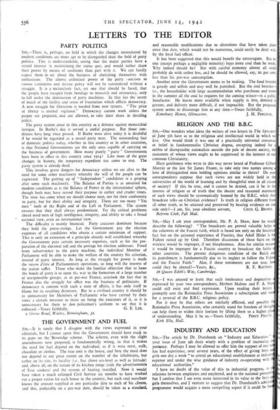LETTERS TO THE EDITOR
PARTY POLITICS
Sut,—There is, perhaps, no field in which the changes necessitated by modern conditions are more apt to be disregarded than the field of party politics. This is understandable, seeing that the major parties have a vested interest in maintaining the status quo, and would rather share their power by means of coalitions than part with it. We can hardly expect them to set about the business of abolishing themselves with enthusiasm. The almost unlimited power of the party (aucuses to choose candidates and dictate policy will not be surrendered without a struggle. It is a melancholy fact, yet one that should be faced, that the people have escaped from bondage to monarch and aristocracy, only to fall under the domination of party machines. In that lies the secret of much of the futility and sense of frustration which afflicts democracy. A new struggle for liberation is needed from new tyrants. " The price of liberty is eternal vigilance." Democracy cannot work unless the people are prepared, and are allowed, to take their share in deciding policy.
The party system arose in this country as a defence against monarchial intrigue. In Burke's day it served a useful purpose. But those con- ditions have long since passed. If Burke were alive today it is doubtful if he would be regarded as a sound party man. The outstanding fact of domestic politics today, whether in this country or in other countries, is that National Governments are the only ones capable of carrying on the business of government. How many purely " party " Governments have been in office in this country since 1914? Like most of the great changes in history, the temporary expedient has come to stay. The party system is already dead.
This involves grave dangers for democracy unless we are alive to the need for some other machinery whereby the will of the people can be expressed. The putting up of " Independent " candidates is a groping after some such machinery. The Balance of Parties is as unsuited for modern conditions as is the Balance of Power in the international sphere, though both may have served their purpose in earlier and cruder times. The time has come when we should choose men, not for their conformity to party, but for their ability and integrity. There are too many " Yes men " both of the Right and of the Left in Parliament. The system ensures that they shall always predominate. Yet the critical problems ahead need men of high intelligence, integrity, and ability to take a broad ' national view, even an international view.
The difficulty is mainly financial. Party caucuses dominate because they hold the purse-strings. Let the Government pay the election expenses of all candidates who obtain a certain minimum of support. This is only an extension of a principle already well established whereby the Government pays certain necessary expenses, such as for the pre- paration of the electoral roll and the postage for election addresses. Freed from subservience to the party machine, the individual Member of Parliament will be able to make the welfare of the country his criterion, instead of party interest. As long as the struggle for power is made the raison d'être of Parliamentary operations, so long will the interest of the nation suffer. Those who make the familiar objection that to loose the bonds of party is to open the way to the formation of a large number of irresponsible groups, as in pre-war France, overlook the fact that in France also the struggle for office was the business of politicians. If democracy is content with such a state of affairs, it has only itself to blame for its resulting distresses. But in a civilised country it should be as unnecessary for Members of Parliament who have carried by their votes a certain measure to insist on being the executors of it, as it is unnecessary for them to don policeman's uniform to see that it is enforced.—Yours faithfully, G. E. LEE. 9 Grove Road, Warley, Birmingham, 32.


























 Previous page
Previous page